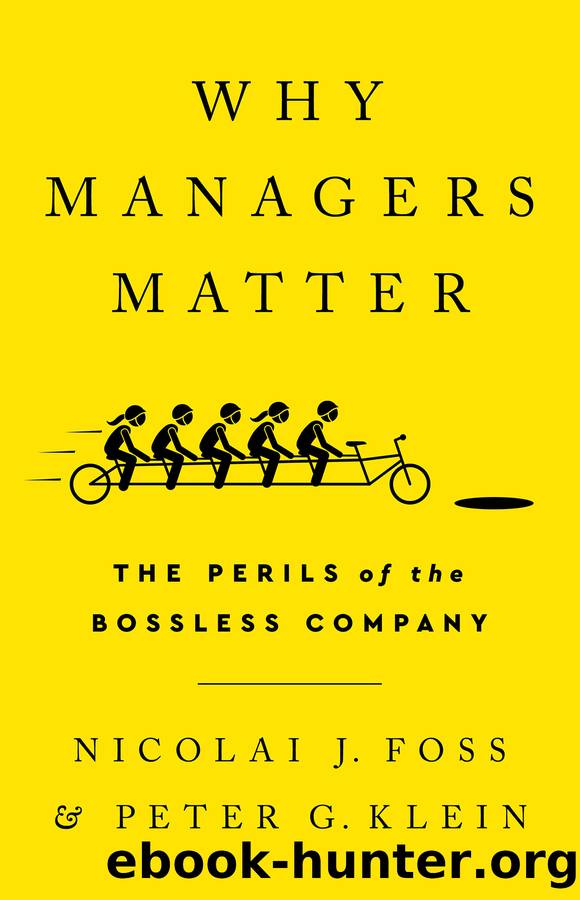Why Managers Matter by Nicolai J Foss

Author:Nicolai J Foss [Nicolai J. Foss and Peter G. Klein]
Language: eng
Format: epub
Publisher: PublicAffairs
Published: 2022-09-04T00:00:00+00:00
WHAT MANAGERS DO
According to Coase and Williamson, then, hierarchy makes economic sense, under certain conditions, essentially because it makes the best possible use of human effort (including cognitive effort) and, when necessary, can sometimes make people expend more effort than they are ânaturallyâ inclined to. This understanding leads to the idea of the manager as a monitorâsomeone who makes sure that the right effort is expended at the right time in the right amount, that schedules are followed, and that work takes place according to the rules. As a practical matter, this role is what most people associate with âmanagement,â and so itâs hardly surprising that management gets a bad rap: few people like to be monitored, controlled, and sanctioned. In fact, we think that too much focus on this aspect of the managerial role may have contributed to the popularity of the bossless company narrative. Focusing on the monitoring role of managers seems to assume that Frederick Winslow Taylor was the only management thinker of note. However, not long after Taylorâs ideas had become influential in US business, a different approach to thinking about management became influential as well, one that in some ways was âsofterâ or more âhumanistic.â
Chester Barnard, a businessman who studied economics at Harvard, sold pianos, and led a dance band, was a key early thinker on the corporation. He was president of the New Jersey Bell Telephone Company, served in the First World War, and later headed the Rockefeller Foundation.
Barnardâs classic 1938 book, The Functions of the Executive, about what CEOs essentially do, is rooted in a deep understanding of companies as social systems facing the twin problems of coordination and cooperation. In this context, the executive defines the companyâs purpose and objectives, giving everyone a sense of direction and adding meaning to work. But efforts also need to be coordinated, so establishing and maintaining the companyâs system of communication is a key executive task. Once the coordination problem is addressed by defining objectives and securing information flows, the remaining cooperation problem is handled by managing employees so that they carry out their jobs in the right way.
To anyone who thinks of all traditional visions of hierarchy as being about crude top-down control, Barnardâs book is an eye-opener. He insists on the overriding importance of good communication, which he sees as not just a matter of having well-defined communication channels but also ensuring that every employee knows about and has access to these channels. Moreover, lines of communication should be short and direct, and every communication must be authenticated. Similar ideas had been disseminated even earlier in the pioneering thinking of Mary Parker Follett. Both Barnard and Follett essentially argue that authority partly depends on communication as well as on the âbuy-inâ of subordinates. To get such buy-in, managers need to treat employees with respect.
This theme resurfaces when Barnard discusses getting employees to contribute to the workplace. He recognizes the role of tangible rewards (the paycheck) in motivating employees, but he also understands the importance of persuasion and the rhetorical aspects of the managerâs job.
Download
This site does not store any files on its server. We only index and link to content provided by other sites. Please contact the content providers to delete copyright contents if any and email us, we'll remove relevant links or contents immediately.
| Ethics | Etiquette |
| Fashion & Image | Health & Stress |
| Motivation & Self-Improvement | Work Life Balance |
| Workplace Culture |
Tools of Titans by Timothy Ferriss(8396)
Change Your Questions, Change Your Life by Marilee Adams(7783)
Deep Work by Cal Newport(7085)
Playing to Win_ How Strategy Really Works by A.G. Lafley & Roger L. Martin(6309)
Man-made Catastrophes and Risk Information Concealment by Dmitry Chernov & Didier Sornette(6019)
Big Magic: Creative Living Beyond Fear by Elizabeth Gilbert(5774)
Digital Minimalism by Cal Newport;(5765)
Ego Is the Enemy by Ryan Holiday(5450)
The Slight Edge by Jeff Olson(5418)
The Motivation Myth by Jeff Haden(5213)
The Laws of Human Nature by Robert Greene(5208)
Stone's Rules by Roger Stone(5088)
Tuesdays with Morrie by Mitch Albom(4784)
Eat That Frog! by Brian Tracy(4540)
Rising Strong by Brene Brown(4463)
Skin in the Game by Nassim Nicholas Taleb(4250)
The Money Culture by Michael Lewis(4207)
Bullshit Jobs by David Graeber(4191)
Skin in the Game: Hidden Asymmetries in Daily Life by Nassim Nicholas Taleb(4007)
